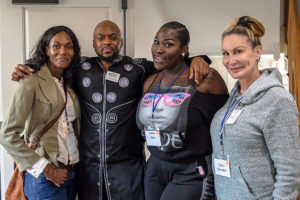Secular Social Justice 2018: Rehumanize, Decolonialize, Get Free
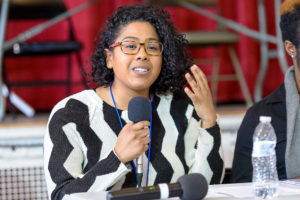
Last Saturday, April 7, over 100 people gathered at All Souls Church in Washington, DC, for the second biannual Secular Social Justice (SSJ) conference, where activists of color led discussions, shared ideas, and promoted strategies with a learning community invested in building a more just society.
Hosted by the American Humanist Association (AHA) and sponsored by several secular organizations, this event centered around the essential characteristics of social justice activism: human responsibility, a concern for the dignity and welfare of all people, and a belief that positive change requires human intervention. These are humanist values, values that ought to motivate those who identify as humanists to act on a moral imperative to defy our allegiance to unjust ideologies and to disrupt systems of oppression. Simply put, unjust ideologies and systems of oppression are incompatible with the aspirations of humanism.
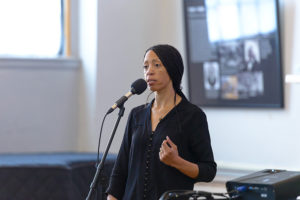
Secular Social Justice was pioneered due to a seeming disconnect between these humanist principles and the actions of individuals and groups that make up organized secular humanist communities. This is something Sikivu Hutchinson, who organized 2016’s SSJ conference at Rice University, addressed during her opening speech. She unpacked how the legacy of social and economic deprivations led to diverging experiences and concerns for communities of color (including atheist and humanist people of color) and emphasized the importance of highlighting the work of activists of color not recognized by the hyper-visibility of white supremacist validation.
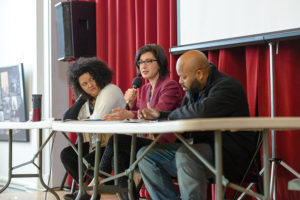 From there, AHA Feminist Humanist Alliance co-chair Jessica Xiao took over as MC, introducing the first conference session led by AHA LGBTQ Humanist Alliance Co-Chair Diane Burkholder and AHA Black Humanist Alliance Co-Chair Ashton Woods. Their strategy session—titled “Not Your Negro: Building Social Justice Spaces for the Oppressed”—explored ways those from marginalized communities can build online and offline spaces in response to navigating an oppressive status quo.
From there, AHA Feminist Humanist Alliance co-chair Jessica Xiao took over as MC, introducing the first conference session led by AHA LGBTQ Humanist Alliance Co-Chair Diane Burkholder and AHA Black Humanist Alliance Co-Chair Ashton Woods. Their strategy session—titled “Not Your Negro: Building Social Justice Spaces for the Oppressed”—explored ways those from marginalized communities can build online and offline spaces in response to navigating an oppressive status quo.
The Sentencing Project’s Research Analyst Nazgol Ghandnoosh, PhD, followed with “Black Lives Matter: Eliminating Racial Inequality in the Criminal Justice System.” She identified four key factors that produce radically unequal 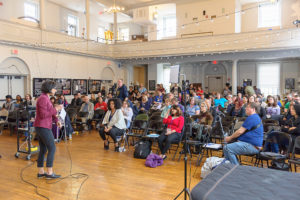 outcomes throughout the criminal justice system: 1) Racial bias in use of discretion, 2) disparate racial impact of “race-neutral” policies, 3) policies and decisions that disadvantage low-income people, and 4) policies that exacerbate socioeconomic inequalities. Ghandnoosh then examined initiatives to minimize these sources of inequality in adult and juvenile justice systems nationwide. One of the stark statistics she provided was that one in nine American men will serve prison time at some point in their lives, and that for Black American men the statistic is one in three.
outcomes throughout the criminal justice system: 1) Racial bias in use of discretion, 2) disparate racial impact of “race-neutral” policies, 3) policies and decisions that disadvantage low-income people, and 4) policies that exacerbate socioeconomic inequalities. Ghandnoosh then examined initiatives to minimize these sources of inequality in adult and juvenile justice systems nationwide. One of the stark statistics she provided was that one in nine American men will serve prison time at some point in their lives, and that for Black American men the statistic is one in three.
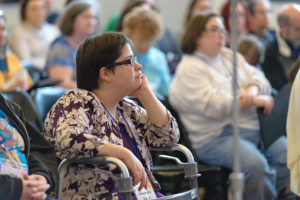 Victoria Rodriquez-Roldan, JD, the director of the National LGBTQ Task Force’s Trans/Gender Non-Conforming Justice Project, took the stage next for a session titled “Disability from an Intersectional Lens.” She examined how we, from a secular perspective, must work towards ensuring that our social justice advocacy is inclusive of disabled advocates, especially those of color and who are LGBTQ and part of other marginalized identities.
Victoria Rodriquez-Roldan, JD, the director of the National LGBTQ Task Force’s Trans/Gender Non-Conforming Justice Project, took the stage next for a session titled “Disability from an Intersectional Lens.” She examined how we, from a secular perspective, must work towards ensuring that our social justice advocacy is inclusive of disabled advocates, especially those of color and who are LGBTQ and part of other marginalized identities.
Political scientist Juhem Navarro-Rivera, PhD, focused on an ever-relevant topic in his session “Immigration Justice for Humanists.” One of President Trump’s priorities is the whitening of the United States by clamping down on immigration. In this presentation, Navarro-Rivera discussed the Christian nationalist underpinnings of Trump’s brand of white nationalism, how the current administration is persecuting immigrants, and provided resources and actions to defend the human rights of immigrants in the United States.
Writer, performance artist, and lawyer Gowri Konesaran shook things up with passionate performance poetry that addressed various social justice issues through art.
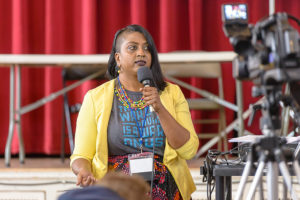 Up next was Rajani Gudlavalleti, a coordinator with both the BRIDGES Coalition and Baltimore Asian Resistance in Solidarity, as well as a board member of the Foundation Beyond Belief. “Unlearning Nixon’s Lies: Harm Reduction as a Strategy to End the War on Drugs,” was an interactive presentation that guided attendees to a better understanding of the racist history and harms of the so-called War on Drugs and the role religion has played in upholding this “war.” She also shared strategies with audience members to reduce these harms in their communities.
Up next was Rajani Gudlavalleti, a coordinator with both the BRIDGES Coalition and Baltimore Asian Resistance in Solidarity, as well as a board member of the Foundation Beyond Belief. “Unlearning Nixon’s Lies: Harm Reduction as a Strategy to End the War on Drugs,” was an interactive presentation that guided attendees to a better understanding of the racist history and harms of the so-called War on Drugs and the role religion has played in upholding this “war.” She also shared strategies with audience members to reduce these harms in their communities.
In her session titled “Pipe Dreams: How the School-to-Prison Pipeline Is Destroying Communities of Color,” Black Humanist Alliance board leader Candace Gorham, MA, LPC, addressed the historical, social, and political changes that have created an educational system that has failed communities of color and provided concrete actions to help create a more just educational system.
Black Lives Matter DC activist and organizer Tracye Redd presented an intro to direct action logic and planning in his session “No Progress Without Confrontation.” While only an introductory session, this was an important step in offering a practical yet controversial means of connecting humanist social justice sensibilities with direct action. History has shown that common decency requires action and that moral logic needs visible evidence. When power is out of balance, civil disobedience may be one of the few tactics left for citizens to push for change through strength in numbers, creativity, and communal display of righteous indignation.
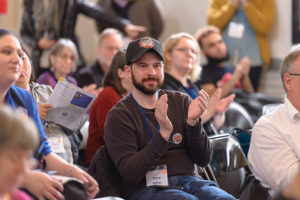
The final session of the day was “The Need to Decolonize and Get Free,” presented by Whitney Shepard, a researcher with the Action Center on Race and the Economy (ACRE), Tracye Redd, and moderator Sam Farooqui. This discussion scrutinized the ravaging impact of the intersection of colonialism, white supremacy, and capitalism on US and global systems, the need for decolonization (and what that looks like), and strategies to achieve collective liberation for oppressed communities.
Last year I questioned whether or not humanism was “the answer” when it came to addressing various ways people are confined even if they’re free from oppressive religious traditions. I expressed concern with the complacency found within organized secular circles, something humanist professor and author Dr. Anthony Pinn touched on when describing his disinterest in humanist endeavors that lack a social justice analysis:
If systems that are premised on human capacity, human responsibility, and human accountability within the confines of the material world and reason can’t offer a way to address the injustice encountered, they pose little of practical use. If they can’t address the well-being of life, what do they offer beyond belittling rhetoric and negation of other systems? If I can’t locate the HUMAN in humanism, it isn’t a system that can help me and those like me move through the world in productive ways.
Humanism that neglects to struggle against the way countless people are dehumanized is about as useful as a screen door on a submarine. The Secular Social Justice conference, attended largely by white secular folks who want to correct this neglect, provides a glimpse into what a humanist movement would look like if it centered its efforts on transforming a profoundly oppressive culture on a more intersectional level and was led by those most directly impacted by that oppression.
